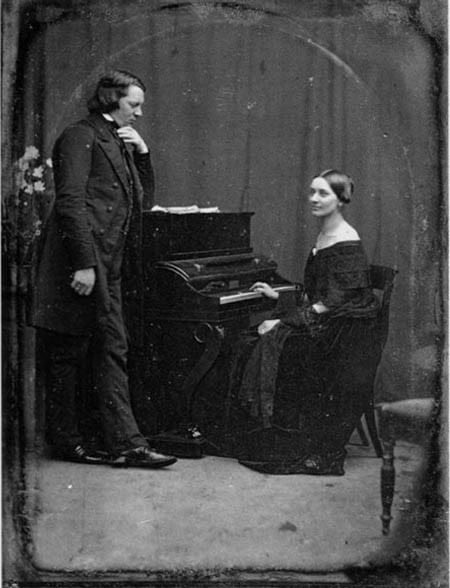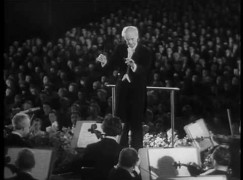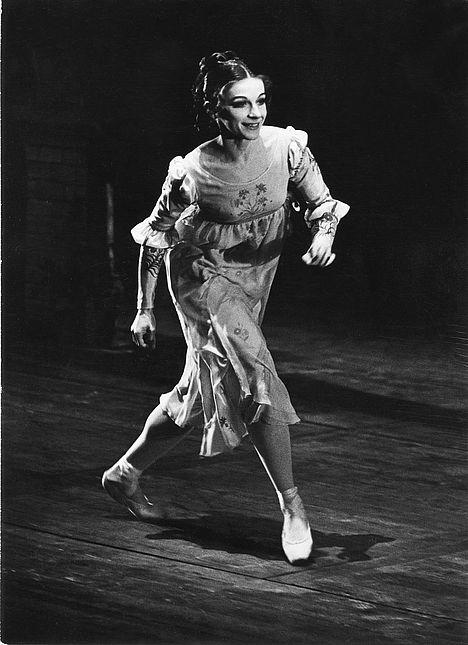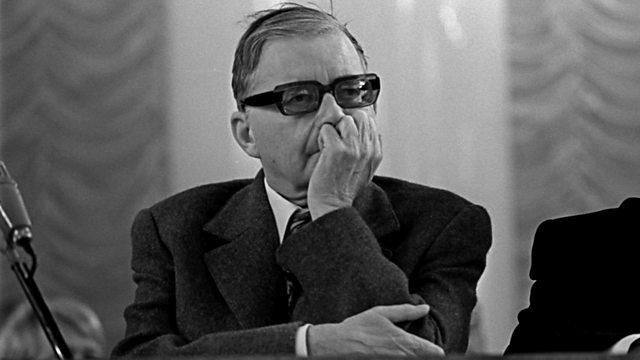Pre-suicide letter by Schumann turns up
mainThe Heinrich Heine Institute Düsseldorf has bought a letter by Robert Schumann written two weeks before his attempted suicide in February 1854.
Schumann had previously written to his friend Julius Stern saying he wanted to quit his job and leave Düsseldorf, asking Stern to take over. A dispute erupted between them. In this letter, Schumann proposed a truce.

A fortnight after, the composer jumped into the freezing, filthy Rhine, was fished out and sent to an asylum.





reading this post, he was in so much of a hurry to jump into the river, he really couldn’t give an “L”…. I know how he feels reading these hastily typed, opinionated diretribes from those that think they are so, so important. may worms feast well one day on your entrails.
“Dire Tribes”? Like the Huns?
To your two salient points:
1. You seem quite upset about someone’s description of a 160+ year old letter.
2. Don’t worry, one day they will. Yours too.
Huh?
Take the rest of the week off!!!
Do we have the contents of the letter ?
Am I missing a link to the text of this letter which has “turned up”? There is a reference to a pre-suicide attempt “remarkable letter” to Julius Stern, with at least some if not all of its text, in Robert Haven Schauffler’s biography of Schumann, copyright 1945. In the letter Schumann makes a pun saying that while he often lives in lovely spheres, a Star (Stern) does not answer his letters. He then points out that his own letters have sounded the tonic and a third and it is up to Stern to supply the fifth. It ends with a farewell “and let us drink together of Lethe.”
Lethe is the underworld river where the dead would forget their mortal troubles by drinking of its waters.
As Schauffler writes: “What masterly understatement about the harmony, and what a prophetic good-by.”
Schauffler then speculates whether Robert Browning knew this letter because his poem Abt Vogler also mixes the poetic conceit of completing a chord with a star (“That out of three sounds he frame, not a fourth sound, but a star. Consider it well: each tone of our scale in itself is naught.”).
At the least the letter was known in 1945. so it can hardly be said to have “turned up.” More accurately, it has a new owner.
I’ve read quite a bit about the Schumanns and Brahms and I don’t recall finding out exactly what it was that Robert Schumann suffered by way of a mental illness. One of his sons was subsequently sent to an ‘asylum’ where he died some years later. The condition, whatever it was, obviously had a genetic element.
Just awful, altogether. The beloved Schumann lives on in his wonderful works.
His son was sent to Colditz which was then being used as an asylum.
This raises more questions than answers. Is there no thought to his wife Clara, to whom he chose not to speak when he was in an asylum for two years?
Arleen- Schumann’s doctors at the Endenich asylum refused to allow Clara to visit her husband, for fear of what such a visit might do to both of them. In any case, it was not so much him choosing not to speak to her, as it was him simply being unable to do so due to his mental state. The young Brahms visited Schumann often and would go for walks with him on the asylum grounds. Initially, Schumann was somewhat stable (doing some composing and editing, and talking shop with Brahms), but he rapidly deteriorated. Ultimately, a day or two before Schumann died in July 1856, Clara demanded to see Robert, and was permitted to do so. He was by that time totally unable to speak, and she fed him jellied consommé while he babbled nonsense words. It was undoubtedly heart-wrenching for her. There is an excellent account of all these events in Jan Swafford’s superb biography of Brahms.
If serious, I urge you to consider Chernaik’s recent biography of Schumann, as it thoroughly covers the bitter sweet complexities of Schumann’s relationship with Clara. I’m a big Schumann fan and enjoyed reading it. https://www.amazon.com/Schumann-Faces-Masks-Judith-Chernaik-ebook/dp/B078LDXP5Y/ref=sr_1_1?dchild=1&keywords=robert+schumann+biography&qid=1590011200&s=books&sr=1-1
Mentally ill people have disordered thinking; it’s part of their condition. To attribute deliberate motives to such a person is to misunderstand the nature of the problem. According to diary entries from Clara and a biographer of Brahms and Schumann, Brahms visited Robert Schumann a few times in that dreadful institution – to which he had asked to be taken!
A psychologist sister once put it to me this way: when you speak to Cluster B Personality Disorders most of the time it’s just like trying to talk to your television!!
Good, useful information, David. Any post-suicide letters? They would be hot. Poor Schumann, when the Poet spoke.
Heinrich Heine Institute raised half a ‘brow, but there’s the “Dichrerliebe” connecttion and one Liederkreis. I wonder if there’s a Freiherr Joseph von Eichendorff Institute for the other Liederkreis. I’d dnever heard of Stern, thank you.
Schauffler wrote “Bethhoven, the Man Who Freed Music”with a useful appendix of works, dates, and dedicatees. Schauffler coined the phrase “Joseph Vance melodies” after the character of a popular novelist, for Beethoven’s valiant themes. And Eichendorff wrote “Abendrot” for Struass’s “Four Last Songs,” the other three from Hermann Hesse.
Henry Bellamann, who wrote “Kings Row”, was a sometime musicologist and contemporary of Schauffler’s, included pages on music in his novels, like Rromain Rolland, Hesse, and most notably Thomas Mann. Everything is just so interesting!
Interesting that it’s Pre-suicide and not Post Suicide!
Yeah, I don’t think it’s necessary to call it a “pre-“suicide note. That’s usually the way they work…